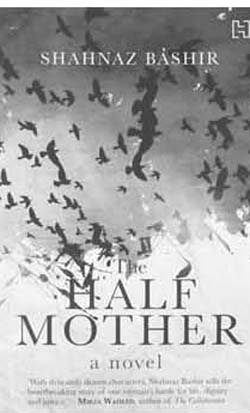The book is set against the backdrop of the rise of insurgency in Kashmir, when what began as a conflict between rival political groups escalated into youth crossing the border into Pakistan to return with kalashnikovs. The brutality with which the army responds turns the valley into a war zone. Kashmir is virtually under siege. The novel provides an insider’s view of how political apathy coalesces with mindless military brutality to wreak havoc on the lives of ordinary people by focusing on one woman’s desperate and futile search for her missing son. Haleema goes everywhere— military camps, radio and television stations, the military hospital, a politician’s house, jails, even a mortuary. The novel is structured in a manner that blurs the boundaries between the personal and the political.
Divided into three sections, the book begins with a short prelude. Titled ‘A Reverie in Retrospect’ it provides the reader a glimpse of what Haleema becomes in the course of her search for her son. Ab Jaan and his wife Boba, the one constant in his otherwise erratic early life, the birth of their daughter Haleema, Boba’s death, Haleema quitting school, her short-lived marriage and the birth of Imran are described with delicate minimalistic ease. As Imran grows up into a warm, sensitive and intelligent boy the mother and grandfather enjoy a brief spell of domestic bliss. Deft brush-stroke like references to Ab Jaan’s past as a radical Sher, his disillusionment following the accession of Kashmir with India, Ab Jaan tuning in to BBC Urdu to know the facts as they are, the increasing number of military bunkers and endless curfews effectively create an atmosphere of fear and insecurity. When Ab Jaan is wantonly killed by the military patrol the fragile cocoon-world of the Joo family has its first-hand experience of what has become everyday reality. However life goes on. Imran writes his tenth standard examination. Then one night the army patrol once again appears at the door. Frightened, Imran tries to escape but is caught.
Book Two begins with the day following Imran’s capture. Haleema goes to meet the Imam and narrates what happened in detail. The Imam accompanies her to the police station where the constable on duty suggests that they go to the local military camp. What follows is a series of debilitating heartwrenching journeys. For the most part Haleema meets with indifference and dismissive cynicism; however these are intricately juxtaposed with unexpected glimpses of human goodness as well as tantalizing slivers of information about Imran. The hope triggered by these tid-bits of sightings keeps the fire alive within her but they also add to her heart-break. The use of visual breaks effectively underscores and heightens the fragmented/fragmenting nature of the search. Another advantage of this kind of structure is that it provides space for voices other than Haleema’s—torture victim Rehbar, his mother Jana, the barber Abdus Salaam, Shafiqa’s son Shaheen, the post-mortem assistant Khizir, and finally and most poignantly Shakeel who is responsible for Imran’ arrest.

